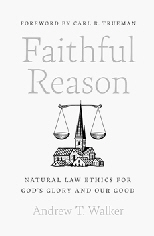"Faithful Reason: Natural Law Ethics For God’s Glory And Our Good" -- By: Jonathon Woodyard
Journal: Eikon
Volume: EIKON 06:2 (Fall 2024)
Article: "Faithful Reason: Natural Law Ethics For God’s Glory And Our Good"
Author: Jonathon Woodyard
Eikon 6.2 (Fall 2024) p. 148
Faithful Reason: Natural Law Ethics For God’s Glory And Our Good
Jonathon D. Woodyard serves as the Vice President for Student Life and Assistant Professor of Historical Theology at Southwest Baptist University. He is married to Gina and they had two boys, Calvin and Caleb.

Andrew Walker. Faithful Reason: Natural Law Ethics for God’s Glory and Our Good. B&H Academic, 2024.
A Morally Ordered Oughtness To The World
There is a moral oughtness to the world. That is, the universe evidences moral design, and humanity should operate in accordance with this design. To deny moral order is to live irrationally and to plunge individually and societally into ruin.
This moral order is divinely imposed and not a social construct. A transcendent being has created this world to operate in ways that are consistent with his being and result in human flourishing. Furthermore, this divinely imposed order is knowable via reason, even to human persons whose reason is marred by the noetic effects of sin. Rational, fallen men and women can truly know what is right and wrong, though those same beings “can err by way of judgment and application” (10).
Given that God has ordered the universe and implanted in humanity “the ability to know right from wrong [i.e. moral order]” (2), human beings should live in light of that moral order for society’s good and God’s glory. As Andrew Walker defines natural law, there is a “God-ordained, God-upheld system of moral order engraved upon an image-bearer’s conscience…” that we can know through reason and that “directs rational creatures to know what actions to do and what goods to fulfill [and] … what actions to avoid and vices to shun” (28).
For Walker, the existence of natural law “gives us rational, coherent ways of understanding the structure of God’s creation order” (42). Thus, our biblically informed
Eikon 6.2 (Fall 2024) p. 149
and held convictions “can be rationally articulated in ways that better benefit human flourishing and the common good” (42). This sense of oughtness (or transcendent moral order) that is engraved on the heart of every person gives a “common moral grammar” (175) to believer and unbeliever alike. In terms of ethics, Christians can and should “couch their arguments” (175) for right and wrong in ways that rational, though supposedly non-religious, persons can grasp.
Development/Structure/Flow
Walker patiently introduces, defines, describes, and clarifies the subject of natural law for the reader. He moves from worldview ...
Click here to subscribe
